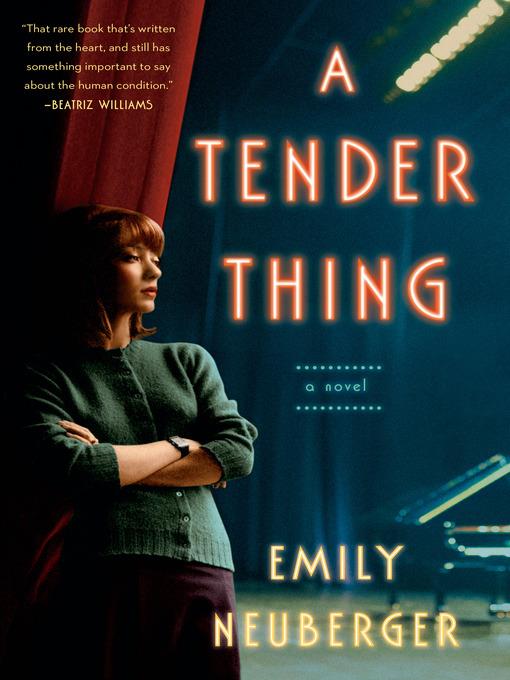
A Tender Thing
کتاب های مرتبط
- اطلاعات
- نقد و بررسی
- دیدگاه کاربران
نقد و بررسی

February 1, 2020
DEBUT In Neuberger's 1950s-set debut, a Midwestern girl runs away to New York to see her name in lights. Eleanor O'Hanlon is obsessed with Broadway musicals, and with star composer Don Mannheim, whose shows are grittier than the usual musical fare. When she auditions at an open call, she is cast as the star of Mannheim's challenging new show--a love story about an affair between a white woman and a black man. The production stirs up racial tensions and brings unwanted notoriety to Eleanor, whose shaky relationship with her family is further damaged by sordid newspaper features about the show. Meanwhile, her world expands as she forms new friendships and romantic crushes that are different from what she first expected. This period piece evokes the golden age of Broadway, from an author whose own performing background shines through. Historical details are well placed, and the characters are engaging. VERDICT While the writing is a little dry at times, the theme is sure to appeal to fans of musical theater. Readers of Elizabeth Gilbert's City of Girls or Fiona Davis's The Chelsea Girls will enjoy, too. [See Prepub Alert, 10/14/19.]--Melanie Kindrachuk, Stratford P.L., Ont.
Copyright 2020 Library Journal, LLC Used with permission.

February 15, 2020
A stage-struck Wisconsin farm girl discovers that musical theater is no refuge from real-world problems. When Eleanor O'Hanlon hears that her favorite Broadway composer, Don Mannheim, is having an open-call audition to replace the star in his current hit, she cashes in the war bonds her parents have been saving for her wedding day to pay for a train ticket to New York. "I'm not some girl who wants to be on Broadway for the fame or glamour," she tells Mannheim when someone else gets the part. "I understand this. I understand you....This is my life." Intrigued, he hires her instead for the lead in his musical work in progress, A Tender Thing. An interracial love story is daring stuff for Broadway in 1958, and Eleanor is thrilled by the chance to work with her idol. Debut author Neuberger, who studied musical theater and writing at NYU, clearly knows the world she's depicting; she brings to life with nice historical detail the rehearsal milieu, complete with a martinet director, unabashedly gay chorus boys, and a production taking shape with daily rewrites and new songs. Eleanor, who knows everything about musical theater and not much about real life, may be the only person in the company who doesn't get why Don takes a special interest in her creatively and displays no interest in her increasingly open romantic overtures. She also doesn't really think about what the public--let alone her parents--might think about Don's deliberately button-pushing subject matter until scarily hostile protests erupt during Boston previews, although her savvy African American co-star, Charles Lawrence, has warned her. Charles is among the novel's many sensitive characterizations, most notable of which is brilliant, conflicted Don: desperately lonely but coldly making use of others' lives to feed his artistic needs. It's Eleanor and Charles who show him the realistic finale his musical demands, and Eleanor's happy ending is a highly qualified one suggesting that she, like Don, will find her deepest relationships in art. Smart, savvy, atmospheric work from a promising new talent.
COPYRIGHT(2020) Kirkus Reviews, ALL RIGHTS RESERVED.

April 13, 2020
Neuberger’s debut, a page-turning homage to 1950s Broadway, imagines a Midwestern girl realizing her dream to star in a musical. Eleanor O’Hanlon, 21, leaves her family’s Wisconsin pig farm to attend an open call for a Broadway show written by the composer/lyricist Don Mannheim (a thinly veiled Stephen Sondheim). Eleanor doesn’t get the part, but Mannheim casts her as the lead in his next project, A Tender Thing, which centers on a groundbreaking interracial love story. During the show’s trial run in Boston, Eleanor faces crowds of protesters bearing signs reading “save segregation” and is taunted by a reporter for kissing her black costar, Charles, on stage. Meanwhile, Eleanor falls for Don, not recognizing he’s gay, and gets caught up in the story of the play, believing she and Charles ought to be able to go out together in New York without attracting fury. While Neuberger’s descriptions of the racists Eleanor and Charles face too often feel swiped from central casting, she finds moments of depth when the actors discuss what it would mean to fulfill the play’s roles in real life. While uneven, Neuberger’s thoughtful tale succeeds at showing how art can both reflect and change how people see the world. Agent: Christy Fletcher, Fletcher & Co.

March 1, 2020
The fantasy of 1950s Broadway occupies the mind of young Eleanor O'Hanlon as she feeds the pigs on her family's Wisconsin farm. With the support of a local music store owner who feeds her musical albums and dreams of New York, Eleanor cultivates her singing voice. When she learns of an open audition for composer Don Mannheim's newest musical, A Tender Thing, she risks it all to take her shot, bringing her best friend, Rosie, along for the ride. Mannheim's creative genius recognizes that Eleanor's raw talent is well suited for his play, which tests the racial boundaries of the period. Amid the glamour of Broadway's Golden Age, Eleanor pushes aside a chance at love, her family's concerns, and all notion of danger in order to star alongside a compelling Black man in a story of forbidden love and tragedy. Although Eleanor's naivete could frustrate some historical fiction readers, the pull of Broadway and the real-life consequences of challenging social norms?alongside a slight nod to romance?keeps the story moving.(Reprinted with permission of Booklist, copyright 2020, American Library Association.)

























دیدگاه کاربران